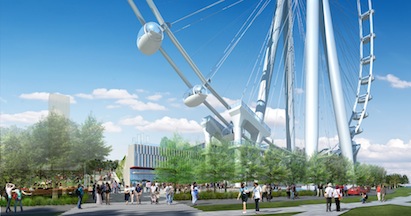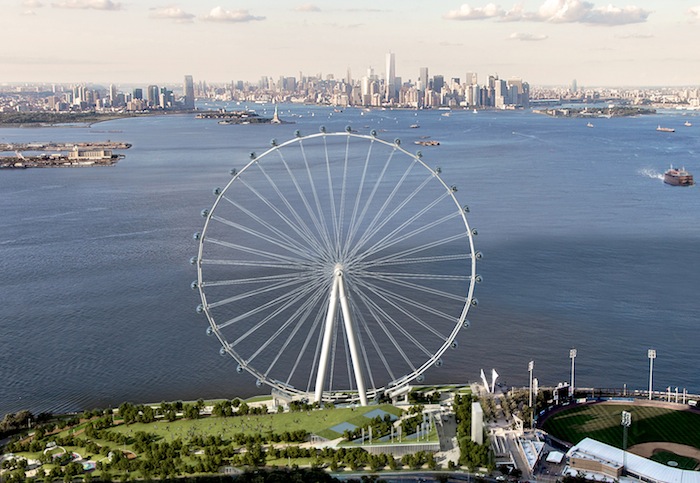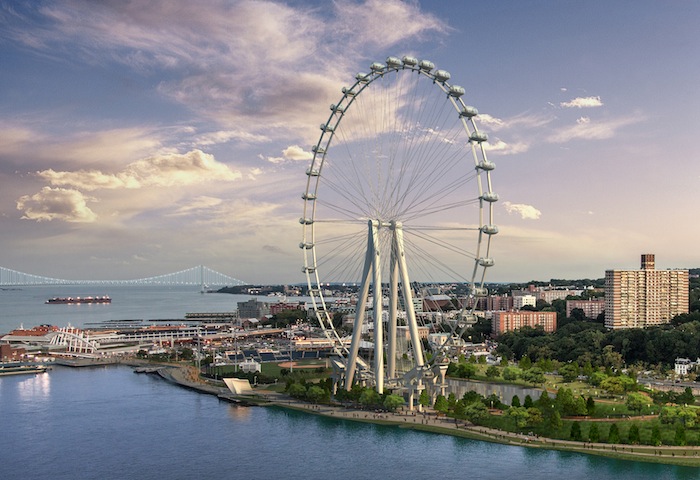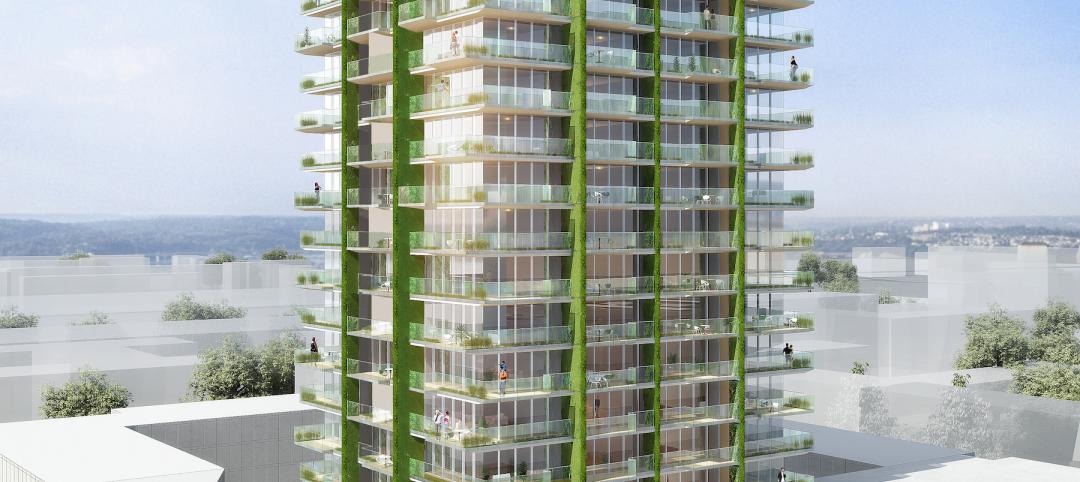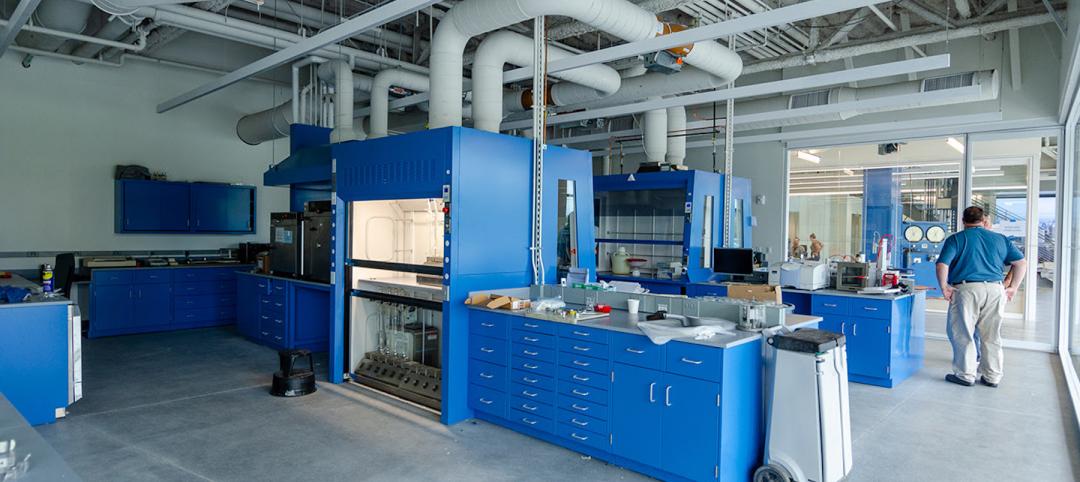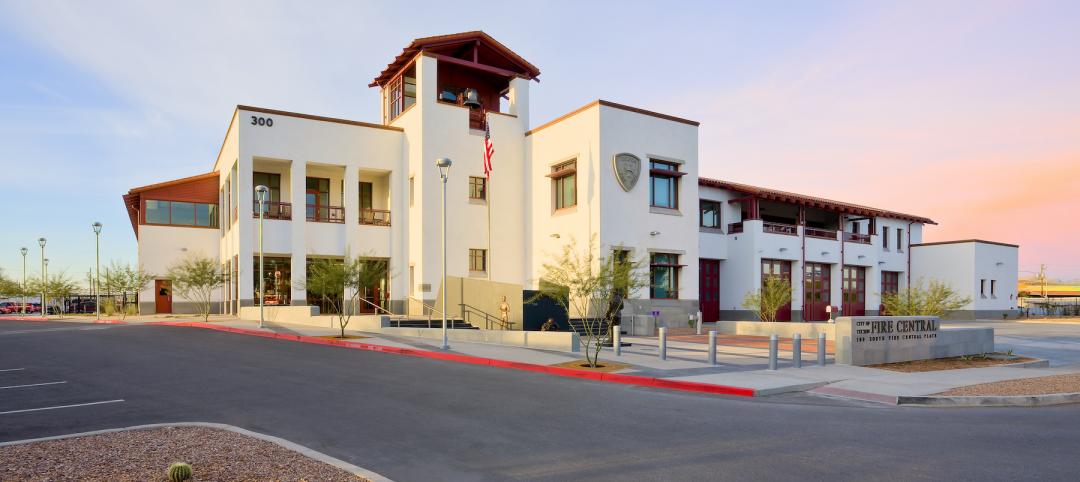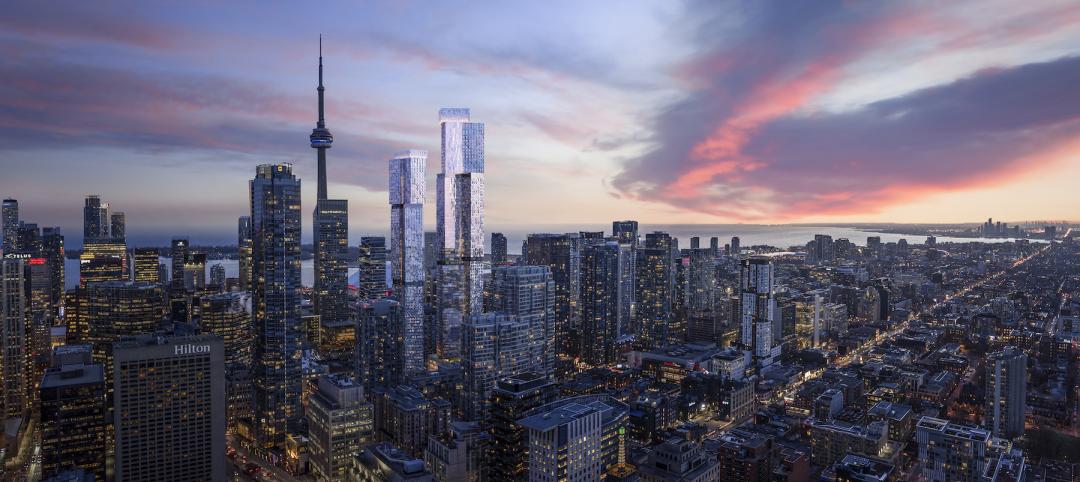The New York office of Perkins Eastman has announced that the New York Wheel, located on the north shore of Staten Island’s St. George neighborhood, was approved by City Council on October 30 and construction is scheduled to begin in 2014. The approval process has been over a year in the making since the project was first announced by the office of Mayor Bloomberg last September. Perkins Eastman is serving as design architect for the on-site 100,000 square-foot Terminal building.
Perkins Eastman will work closely with Richard Marin, CEO of New York Wheel LLC, and landscape architecture firm M. Paul Friedberg and Partners. The development will comprise retail, entertainment, dining and open space amenities amidst a compelling, integrated waterfront site that will attract millions of tourists and residents year round. Scheduled to open to the public in 2016, this currently underused shore land adjacent to the ferry terminal will become a dynamic mixed-use district. In addition to the 630-foot observation wheel, engineered by the designers of the London Eye, key components to the site will include the Terminal building, a 950-car parking garage, a bus storage facility, and an extensive landscape and sustainability program designed to provide a variety of open spaces. The Perkins Eastman design team is led by Principals Stanton Eckstut FAIA, Navid Maqami AIA, LEED AP, and Associate Principal Jonathan Cohn AIA, LEED AP.
The Terminal and its landscaped roof deck will link the water’s edge with the existing fabric of the site, offering expanses of public space for recreation, picnicking, promenade walks, cultural activities and more. “The design is intended to blur distinctions between architecture and landscape,” says Maqami, who is serving as Design Principal on the project. “The Terminal and its surrounding area will frame the iconic structure of the Wheel while providing great places that connect Richmond Terrace to the waterfront.”
While situated above grade level, the building was inspired by and designed to be part of the landscape itself, while meeting the highest standards for sustainable design and resilient waterfront development. The building’s generous interior will offer visitors clear sight lines to the Wheel, New York Harbor and beyond. Program spaces include ticketing, exhibition space, food and beverage areas, and retail opportunities. Given its proximity to the shoreline and the sustainable energy the site will draw from wind, water and sun, the Terminal building will continually devote space to educational exhibitions on alternative energy, green and resilient design, and the history of New York City, among other topics.
About Perkins Eastman
Perkins Eastman is among the top design and architecture firms in the world. With 700 employees in 13 locations around the globe, Perkins Eastman practices at every scale of the built environment. From niche buildings to complex projects that enrich whole communities, the firm’s portfolio reflects a dedication to progressive and inventive design that enhances the quality of the human experience. The firm’s portfolio includes high-end residential, commercial, hotels, retail, office buildings, and corporate interiors, to schools, hospitals, museums, senior living, and public sector facilities. Perkins Eastman provides award-winning design through its offices in North America (New York, NY; Boston, MA; Charlotte, NC; Chicago, IL; Pittsburgh, PA; San Francisco, CA; Stamford, CT; Toronto, Canada; and Washington, DC); South America (Guayaquil, Ecuador); North Africa and Middle East (Dubai, UAE); and Asia (Mumbai, India, and Shanghai, China).
About The New York Wheel LLC
The New York Wheel, located on the North Shore of Staten Island, will be the tallest observation wheel in the world and the only attraction of its kind in New York City. The 630-foot (roughly 60-story) Wheel will feature thirty-six capsules, each carrying up to 40 passengers, that will offer incomparable views of Lower and Midtown Manhattan, the Statue of Liberty, New York Harbor, and beyond both the Verrazano and the George Washington Bridges, for the duration of each 38-minute revolution. The attraction will accommodate as many as 1,440 people per trip, and will welcome as many as 30,000 visitors each day and an anticipated 4 million visitors per year.
The New York Wheel project was originally proposed in response to the New York City Economic Development Corporation’s Request for Expressions of Interest (RFEI) released in 2011 for projects that would increase economic growth, boost tourism, and create jobs on Staten Island. Meir Laufer is the founder of New York Wheel. The New York Wheel has been designed by a team from Starneth B.V., Perkins Eastman Architects and M. Paul Friedberg & Partners. It is expected to begin construction in 2014 with a grand opening scheduled for 2016. For more information about the New York Wheel visitwww.newyorkwheel.com
About M. Paul Friedberg and Partners
MPFP, LLC / M. Paul Friedberg and Partners, established in 1958, is one of the most well known and highly regarded interdisciplinary landscape architecture, urban design and planning firms in the country. Lead by Rick Parisi, FASLA, the firm provides a full range of services including planning, programming, designing, engineering and construction supervision of mixed use, commercial-institutional facilities, and new residential communities, with an emphasis on the creation of parks, play environments, and plazas. MPFP provides the experience and the capability to direct complex projects from concept to implementation, with a sense of continuity and a detailed understanding of site and audience. The firm is also proficient in a variety of environmental analysis, product design and development, graphics, civic and promotional programming, research, and community participation activities. MPFP is highly successful in working with municipalities, arts groups, architects, and artists. From their office in New York, the firm has completed projects in numerous international locations including Israel, Brazil, Greece, Turkey, Egypt, India, Hong Kong and Japan. The quality of their work has been recognized with over 100 professional honors and awards from organizations such as the American Society of Landscape Architects, the American Planning Association, the American Institute of Architects, the Building Stone Institute, and the Municipal Arts Society. For more information visit www.mpfp.com
Related Stories
Building Team | Apr 20, 2022
White House works with state, local governments to bolster building performance standards
The former head of the U.S. Green Building Council says the Biden Administration’s formation of the National Building Performance Standards Coalition is a “tremendous” step in the right direction to raise building performance standards in the U.S.
Market Data | Apr 20, 2022
Pace of demand for design services rapidly accelerates
Demand for design services in March expanded sharply from February according to a new report today from The American Institute of Architects (AIA).
Multifamily Housing | Apr 20, 2022
A Frankfurt tower gives residents greenery-framed views
In Frankfurt, Germany, the 27-floor EDEN tower boasts an exterior “living wall system”: 186,000 plants that cover about 20 percent of the building’s facade.
AEC Tech | Apr 19, 2022
VDC maturity and the key to driving better, more predictable outcomes
While more stakeholders across the AEC value chain embrace the concept of virtual design and construction, what is driving the vastly different results that organizations achieve? The answer lies within an assessment of VDC maturity.
Healthcare Facilities | Apr 19, 2022
6 trends to watch in healthcare design
As the healthcare landscape continues to evolve, IMEG’s healthcare leaders from across the country are seeing several emerging trends that are poised to have wide-ranging impacts on facility design and construction. Following are six of the trends and strategies they expect to become more commonplace in 2022 and the years to come.
Concrete Technology | Apr 19, 2022
SGH’s Applied Science & Research Center achieves ISO 17025 accreditation for concrete testing procedures
Simpson Gumpertz & Heger’s (SGH) Applied Science & Research Center recently received ISO/IEC17025 accreditation from the American Association for Laboratory Accreditation (A2LA) for several concrete testing methods.
Sponsored | BD+C University Course | Apr 19, 2022
Multi-story building systems and selection criteria
This course outlines the attributes, functions, benefits, limits, and acoustic qualities of composite deck slabs. It reviews the three primary types of composite systems that represent the full range of long-span composite floor systems and examines the criteria for their selection, design, and engineering.
Building Team | Apr 18, 2022
Shive-Hattery Acquires WSM Architects
Shive-Hattery announces that it has acquired WSM Architects, Inc., a 13-person architecture firm in Tucson, Arizona.
Building Team | Apr 15, 2022
Frank Gehry to design his largest building yet for his hometown of Toronto
Famed architect Frank Gehry will design his largest building to date for his hometown of Toronto, Canada.
Healthcare Facilities | Apr 14, 2022
Healthcare construction veteran creates next-level IPD process for hospital projects
Can integrated project delivery work without incentives for building team members? Denton Wilson thinks so.


